Trump, Biden and the world
A presidential election in the United States is an international event. For decades, the question of who occupies the White House has had a direct bearing on the shape of the global economy, on the turbulent politics of democracies nearby, and on the conflicts roiling societies thousands of miles away. As America approaches what may be its most consequential vote in decades, The Washington Post’s Today’s WorldView column took a look at what is at stake for governments around the world.
In some places, the prospect of President Trump returning to power is unwelcome. His wrecking-ball approach to diplomacy — from tweeted threats to trashed treaties — disturbed traditional U.S. alliances. Trump’s embrace of far-right politics at home and launching of trade wars abroad left many to question the future of the liberal world order. Putative adversaries, especially in China and Russia, see in a Trump second term the further fraying of 20th-century alliances and the possible acceleration of American decline on the world stage.
Though Trump’s challenger, former vice president Joe Biden, has promised a kind of restoration, most governments aren’t holding their breath. A Biden presidency may boost collective action on international challenges such climate change and the novel coronavirus pandemic. But it won’t magically return the United States to an era of unquestioned American primacy, one that already seemed to be waning when Biden was last in office. Many people around the world watch the U.S. election more out of curiosity and sympathy for a troubled friend than concern about the fate of their own countries.
Here is what the upcoming election means for some key countries around the globe.
 (Alexander Nemenov/AFP/Getty Images; Washington Post Illustration)
(Alexander Nemenov/AFP/Getty Images; Washington Post Illustration) What the U.S. election means for Russia
For half a decade, the spectral presence of Russia has haunted U.S. politics. Moscow’s influence operations played a disputed role in Trump’s surprise 2016 election victory. Once in power, Trump was plunged almost immediately into legal battles over his campaign’s contacts with Kremlin operatives, charges that Trump constantly waved away as a “hoax,” but which saw a number of his former colleagues criminally indicted.
What Moscow has gained from its efforts to sow chaos in the American domestic scene is more an open question. Russia is in a weaker place in 2020 than it was in 2016, its economy hobbled by a crash in oil prices and its public growing markedly frustrated with long-ruling President Vladimir Putin. Now, as Biden’s chances of victory in the election rise, according to polls, the Russian ruble is slumping over fears that a change in administration may lead to more sanctions and an even deeper freeze in U.S.-Russia relations. Read the full story
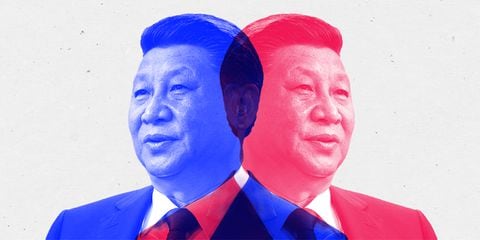 (Michele Tantussi/Getty Images; Washington Post illustration)
(Michele Tantussi/Getty Images; Washington Post illustration) What the U.S. election means for China
Under Trump, a new “Cold War” is underway, at least according to hawks in Washington. Almost four years of Trump lobbing tariffs and tweeting threats at Beijing hardened geopolitical fault lines and set the stage for a great-power competition that may define the decades to come. On a host of global issues, China is the White House’s preferred villain — its trade tactics seen as unfair and duplicitous, its opaque government cast as the incubator of a hideous pandemic, its tech companies Trojan horses and its oppression of ethnic minorities in Xinjiang and pro-democracy protesters in Hong Kong the emblems of the 21st century’s authoritarian behemoth.
In the past decade, Chinese President Xi Jinping has taken his country in a more clearly repressive direction, purging political rivals, squeezing the already narrow space for civil society and tightening Beijing’s grip over its restive periphery. At international forums, Xi presents his nation as a responsible stakeholder in the world order. But at home, an emerging vanguard of influential Chinese intellectuals now dismiss liberal ideas in favor of a clearer ideology of Chinese might. Read the full story
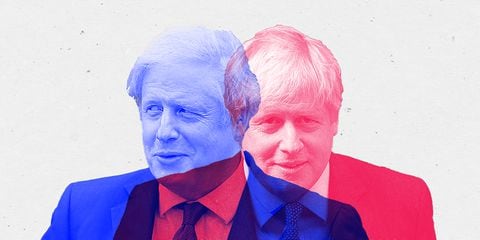 (Brian Lawless/WPA Pool/Getty Images and Leon Neal/Getty Images; Washington Post illustration)
(Brian Lawless/WPA Pool/Getty Images and Leon Neal/Getty Images; Washington Post illustration) What the U.S. election means for Britain
by Adam Taylor
British Prime Minister Boris Johnson staked his career on betting against the European Union and won. It might seem obvious which candidate he would be likely to support in the U.S. election: Trump is the self-proclaimed “Mr. Brexit” who compares his own unexpected path to victory in 2016 to the British wave that eventually washed Johnson into 10 Downing Street.
Then there’s Biden. The former vice president is no Mr. Brexit. His old boss, former president Barack Obama, criticized the Brexit vote. In response, Johnson wrote a column claiming Obama’s “ancestral dislike of the British” was due to his “part-Kenyan” heritage. Last month, adding to Westminster’s worries, Biden broke a lengthy period of silence on Brexit to offer support for Ireland and the Good Friday Agreement.
That hardly means most in the British government would welcome a Trump win. Current and former officials in Washington and London caution that private negotiations are more complex than the public Trump and Johnson bromance would suggest. But a Biden presidency may not be a perfect match either. Read the full story
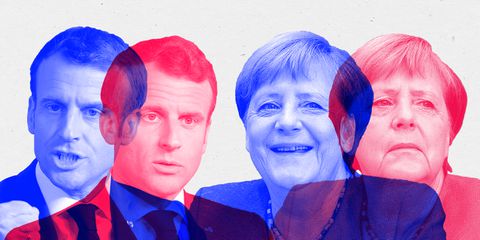 (Sean Gallup, Thierry Monasse and Henning Schacht/Getty Images; Washington Post illustration)
(Sean Gallup, Thierry Monasse and Henning Schacht/Getty Images; Washington Post illustration) What the U.S. election means for Europe
Europeans do not approve of Trump — by huge margins in recent surveys. So dim is the view of the U.S. leader that many survey respondents place less hope in him doing the “right thing regarding global affairs” than Chinese President Xi Jinping, according to the Pew Research Center. In a recent YouGov poll, substantial majorities across the continent said they favored a Biden victory.
On one level, this reflects a genuine yearning for a Biden presidency after four years of Trumpian volatility. But on a deeper level, Europe’s view of America is also changing. “European attitudes to Americans are shifting from envy to compassion,” wrote Simon Kuper of the Financial Times. He added that “there’s more chance of becoming a billionaire, if that’s your thing, in Scandinavia than in the U.S.,” pointing to widening inequity in the United States and the withering of romantic notions of the “American Dream.” Read the full story
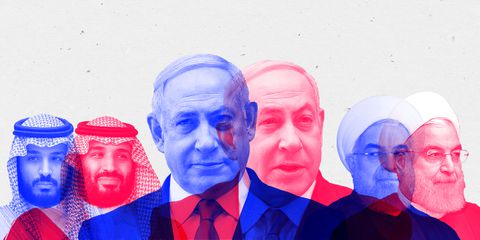 (Nicolas Asfouri/Pool/Getty Images, Fethi Belaid/AFP/Getty Images, Gali Tibbon/Pool/AFP/Getty Images, Jim Watson/AFP/Getty Images, Du Xiaoyi/Pool/Xinhua News Agency; Washington Post illustration)
(Nicolas Asfouri/Pool/Getty Images, Fethi Belaid/AFP/Getty Images, Gali Tibbon/Pool/AFP/Getty Images, Jim Watson/AFP/Getty Images, Du Xiaoyi/Pool/Xinhua News Agency; Washington Post illustration) What the U.S. election means for the Middle East
For ordinary people living in the Middle East’s many crisis spots, it won’t matter much whether Trump or his Democratic challenger wins the White House. Both the Trump administration and that which Biden served saw the region’s tangled conflicts and yearned for an escape. Neither managed to do it. Instead, U.S. air campaigns intensified, and U.S. troops remain deployed across numerous countries. For all its stated desire to disentangle itself from the Middle East, Washington has a hard time letting go.
But Biden and Trump represent two markedly different futures for some of the region’s political elites, especially the leadership in Israel and a clutch of oil-rich Arab monarchies. They cheered Trump on as he went about upturning his predecessor’s major accomplishment in the region — ceasing American participation in the Iran nuclear deal by reimposing sanctions and invoking a “maximum pressure” campaign on the regime in Tehran. And he pursued a new approach to the Israeli-Palestinian peace process that entirely favored the interests of the Israeli right. Though those efforts were met with outrage from Palestinians, they faced mostly muted protest from Arab leaders elsewhere.
On both those fronts, a Democratic victory in November could signal a dramatic reversal. Read the full story
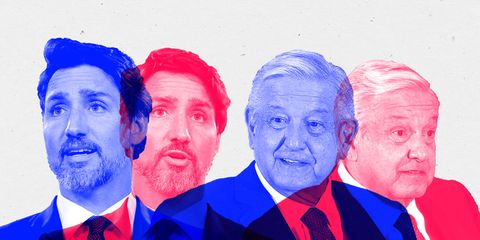 (Dave Chan/AFP/Getty Images, Hector Vivas/Getty Images, Marco Ugarte/AP; Washington Post illustration)
(Dave Chan/AFP/Getty Images, Hector Vivas/Getty Images, Marco Ugarte/AP; Washington Post illustration) What the U.S. election means for Canada and Mexico
It’s been a tricky time to be an American neighbor. Trump announced his candidacy for the White House in 2015 with a crude attack on Mexico, casting migrants from the country as interloping “rapists,” and later vowed to make Mexico pay for a wall on the southern U.S. border. In 2018, Trump wheeled on the country to the north, invoking national security concerns to slap tariffs on certain Canadian exports. He branded Canadian Prime Minister Justin Trudeau as “dishonest” and “very weak,” while bullying his way to a renegotiation of the free trade agreement linking the continent’s economies.
In the final year of his term, Trump arguably has better relations with Mexican President Andrés Manuel López Obrador than with Trudeau. In July, López Obrador came to the White House to celebrate the signing of Trump’s rebranded version of the North American Free Trade Agreement. It was not markedly different from the treaty hashed out more than two decades ago, but it gave Trump another set-piece moment. Trudeau avoided the occasion, but López Obrador made it the first foreign outing of his presidency, no matter the rebukes of critics on both sides of the border. Read the full story






